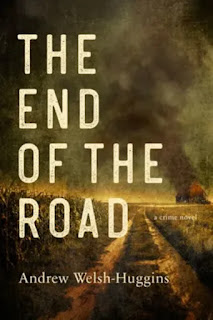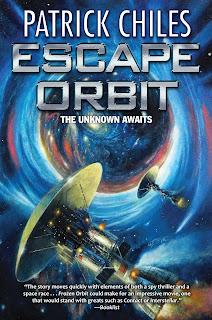 series, featuring a former Ohio State and Cleveland Browns quarterback turned investigator, and editor of Columbus Noir. His stories have appeared in Alfred Hitchcock Mystery Magazine, Ellery Queen Mystery Magazine, Mystery Magazine, the 2022 anthology Paranoia Blues: Crime Fiction Inspired by the Songs of Paul Simon, and other magazines and anthologies. Kirkus calls his new crime novel, The End of the Road, "A crackerjack crime yarn chockablock with miscreants and a supersonic pace.”
series, featuring a former Ohio State and Cleveland Browns quarterback turned investigator, and editor of Columbus Noir. His stories have appeared in Alfred Hitchcock Mystery Magazine, Ellery Queen Mystery Magazine, Mystery Magazine, the 2022 anthology Paranoia Blues: Crime Fiction Inspired by the Songs of Paul Simon, and other magazines and anthologies. Kirkus calls his new crime novel, The End of the Road, "A crackerjack crime yarn chockablock with miscreants and a supersonic pace.”
Recently I asked the author about what he was reading. His reply:
The Glassmaker’s Wife, Lee MartinVisit Andrew Welsh-Huggins's website.
Martin, a Pulitzer Prize fiction finalist for The Bright Forever, reimagines the 1840s trial of a woman in Illinois accused of fatally poisoning her husband.Martin draws on bare-bone facts of a real murder and subsequent trial to spin straw into gold by creating vivid characters, a compelling sense of place, and a driven plot, all in lyrical prose that at times reads like something actually written in the nineteenth century.
The Echoes, Jess Montgomery
A fascinating, thoughtful, and engaging read, not to mention a masterclass in how to write historical mystery fiction. The latest in Montgomery’s series about female Sheriff Lily Ross set in 1928 Ohio, the book perfectly captures the feel of the era and the rural landscape without hitting you over the head with details of the research that Montgomery obviously did to bring the story to life.
Didn’t Nobody Give A Shit What Happened to Carlotta, James Hannaham
A tour de force of narrative voice. Hannaham recasts Homer’s Odyssey as the tale of Carlotta Mercedes, a Black trans woman released from prison after twenty years in Ithaca in upstate New York and now finding her way through a vastly changed New York City over the weekend of July Fourth, 2015. Carlotta’s first person account of her journey is funny, biting, poignant, raucous, emotional, and so much more. I can’t recommend this book highly enough.
My Book, The Movie: An Empty Grave.
Q&A with Andrew Welsh-Huggins.
The Page 69 Test: An Empty Grave.
--Marshal Zeringue



















